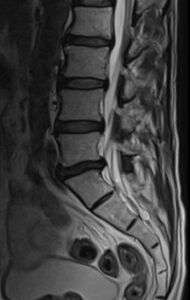
Dr. Petya Stefanova
Teacher
Assistant at the Faculty of Medicine at Sofia University and resident physician in Neurology at Sofiamed University Hospital.
Въпроси
Резюмета
Видеа
Аудио
Какво определя един рефлекс като болестно усилен – хиперрефлексия?
ноември 14, 2023
За хиперрефлексията е вярно, че:
ноември 14, 2023
Which of the following reflexes is typically affected in polyradiculoneuropathy (Guillain-Barré syndrome)?
ноември 13, 2023
Which statement best describes the Babinski reflex in acute stroke?
ноември 13, 2023
What is the significance of a positive Babinski reflex in a neurological examination of the right foot?
ноември 13, 2023
In which of the following conditions is generalized hyperreflexia commonly observed?
ноември 13, 2023
Which of the following items typically determine a tendon reflex as pathological hypereflexia in a clinical examination?
ноември 13, 2023
What is anisoreflexia in the context of neurology?
ноември 13, 2023
Which of the following reflexes can be observed in healthy babies?
ноември 13, 2023
What does the term “agnosia” refer to?
октомври 31, 2023
What are the most common types of psychiatric problems in the elderly?
октомври 31, 2023
Към екстрапирамидната система се отнасят пътища, които преминават:
октомври 31, 2023
What is a key difference between the pyramidal and extrapyramidal pathways in the central nervous system?
октомври 31, 2023
Кои симптоми насочват към засягане на екстрапирамидната система?
октомври 31, 2023
What are the primary functions of the extrapyramidal system in the central nervous system?
октомври 31, 2023
Parkinson’s Disease Differential Diagnosis Questionnaire
октомври 18, 2024
Role of the Direct and Indirect Pathways in the Extrapyramidal System: Balancing Motor Control
октомври 14, 2024

The Unified Parkinson’s Disease Rating Scale (UPDRS)
октомври 11, 2024
Lewy Body Dementia with Parkinsonism versus Parkinson’s Disease
октомври 11, 2024

Protective Factors for Parkinson’s Disease: Physical Activity, Smoking, and Caffeine
октомври 6, 2024
Alpha-Synuclein vs. Tau Protein: A Comparative Overview
октомври 6, 2024
Diet Recommendations for Patients with Multiple Sclerosis
август 6, 2024
Wallenberg Syndrome (Lateral Medullary Syndrome)
август 6, 2024
Fake Smiles, Real Damage: How Digital Joy Breeds Fear and Anger
май 3, 2025
Understanding Neuropsychological Evaluations: What to Expect
февруари 25, 2025
Невропсихологическо изследване – индикации, провеждане и резултати
февруари 24, 2025
Невропсихологическо изследване – индикации, провеждане и резултати
февруари 24, 2025





